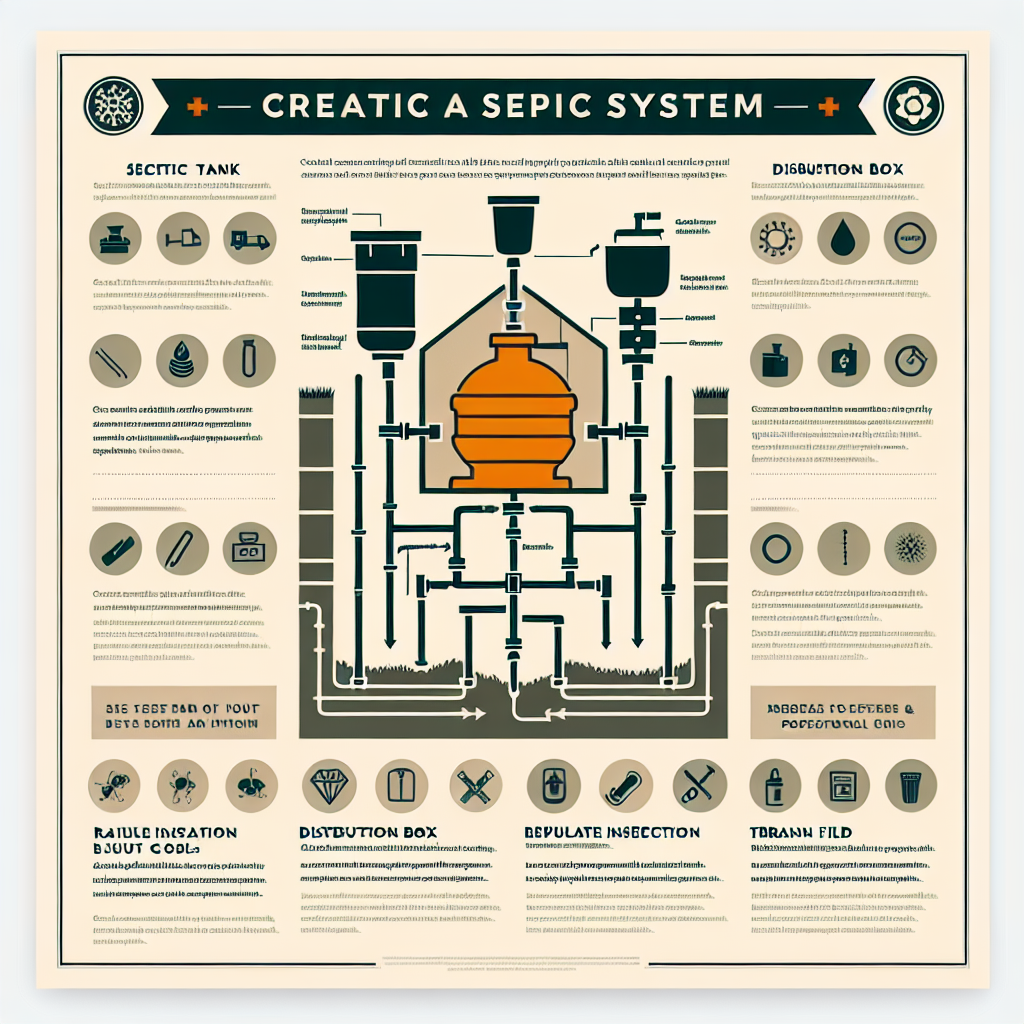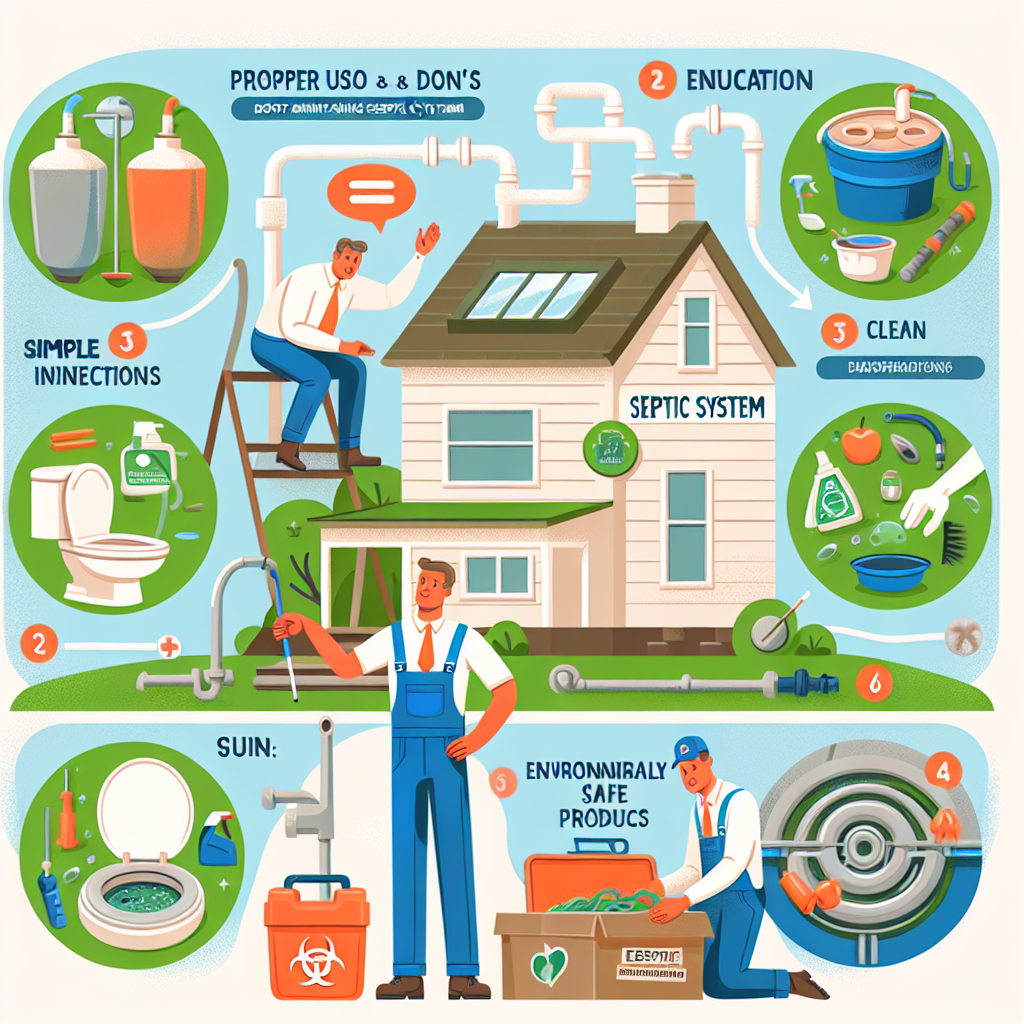Maintaining a septic system may seem daunting, but with a few simple tips, you can keep it running smoothly for years to come. From regular inspections to mindful water usage, this article will guide you through the essential steps to minimize potential issues and ensure the longevity of your septic system. So, read on and discover how easy it is to keep your septic system in its prime condition.
Regular Pumping
How Often To Pump
Regular pumping is an essential part of septic system maintenance. It involves removing the accumulated solid waste from the septic tank to prevent clogs and backups. The frequency of pumping depends on the size of your tank and the number of occupants in your household. As a general rule, it is recommended to have your septic tank pumped every 3 to 5 years. However, if you have a smaller tank or a larger family, more frequent pumping might be necessary.
Hiring a Professional
While pumping a septic tank may seem like a straightforward task, it is highly recommended to hire a professional for this job. Septic tank pumping requires specialized equipment and expertise to ensure efficient and thorough removal of waste. Professionals have the necessary knowledge and experience to handle any potential issues that may arise during the pumping process. Additionally, they can perform a thorough inspection of the tank and its components, identifying any potential problems before they escalate into costly repairs.
Water Conservation
Limit Water Usage
Conserving water is not only beneficial for the environment, but it also helps maintain a healthy septic system. Excessive water usage can overload the system and hinder its ability to treat waste effectively. To limit water usage, be mindful of your daily routines. Turn off the faucet while brushing your teeth, take shorter showers, and only run the dishwasher and washing machine with full loads. Small changes in your water consumption habits can go a long way in preserving the longevity and functionality of your septic system.
Use High-Efficiency Fixtures
Another effective way to conserve water and support your septic system’s health is by using high-efficiency fixtures. Low-flow toilets, faucets, and showerheads are designed to minimize water usage without compromising performance. These fixtures can significantly reduce water consumption, alleviating the strain on your septic system. When replacing old fixtures, consider opting for high-efficiency models to promote water conservation and sustainability.

Proper Disposal
Avoid Flushing Non-Biodegradable Items
One common mistake many homeowners make is flushing non-biodegradable items down the toilet or drain. Items such as wipes, dental floss, feminine hygiene products, and paper towels do not break down easily and can cause clogs in your septic system. It is crucial to dispose of these items in the trash instead. Educate all household members about the importance of only flushing biodegradable waste to avoid potential blockages and system malfunctions.
Use Septic-Safe Products
When it comes to cleaning and maintaining your home, it is essential to choose septic-safe products. Harsh chemicals, antibacterial soaps, and bleach can disrupt the natural balance of bacteria in your septic tank, hindering its ability to break down waste effectively. Look for cleaning products labeled as septic-safe, or consider using natural alternatives such as vinegar and baking soda. Additionally, be cautious when using additives or treatments marketed as septic system enhancers, as their effectiveness is often debated among experts.
Avoid Chemicals
Chemical Cleaners and Septic Systems
Chemical cleaners may seem like a convenient solution for tough stains and odors, but they can have detrimental effects on your septic system. Harsh chemicals in cleaning products can kill the beneficial bacteria responsible for breaking down waste in the septic tank. This can lead to an imbalance in the system, reducing its overall effectiveness. Instead, opt for environmentally-friendly cleaning options, such as enzyme-based or biodegradable cleaners, to safely and effectively clean your household surfaces without compromising your septic system’s health.
Chemical Pest Control Products
Using chemical pesticides or insecticides near your septic system can also pose risks. These chemicals can seep into the ground and contaminate the soil, potentially harming the beneficial bacteria in your septic tank. Instead of relying solely on chemical pest control, consider using natural alternatives to address any pest or insect issues around your property. Integrated pest management techniques, such as removing food sources or sealing entry points, can help prevent infestations without compromising the balance of your septic system.

Maintain Drain Field
Keep Heavy Machinery Off
The drain field is a critical component of your septic system that helps disperse treated wastewater into the soil. To ensure its proper functioning, it is crucial to keep heavy machinery, vehicles, and even livestock off the drain field. The excess weight can compact the soil, disturb the pipes, and disrupt the drainage process. If the drain field is damaged or unable to effectively absorb the wastewater, it can lead to sewage backups and system failure. Taking care to avoid any unnecessary traffic on the drain field can significantly extend the life and efficiency of your septic system.
Avoid Planting Trees or Shrubs Nearby
Planting trees or shrubs near the drain field may seem like a lovely landscaping idea, but it can have severe consequences for your septic system. The roots of these plants can infiltrate the pipes, causing blockages and damage. As they grow, the roots can even crack or break the pipes, resulting in costly repairs. To avoid this issue, it is best to avoid planting any deep-rooted vegetation in close proximity to the drain field. If you are unsure about the suitable planting distance from your septic system, consult with a professional for guidance.
Inspect for Leaks
Check for Dripping Faucets
Regularly checking for leaks in your plumbing system is crucial for maintaining a healthy septic system. Even small drips from faucets or pipes can lead to significant water waste, which can overload your septic tank. Take the time to inspect all faucets, both indoors and outdoors, for any signs of leaking. If you notice any drips or leaks, promptly repair or replace the affected fixtures. Fixing leaks not only conserves water but also helps maintain the overall balance and performance of your septic system.
Monitor Toilets for Running Continuously
A continuously running toilet is not only an annoyance but also a potential sign of a larger problem in your septic system. A running toilet can waste a significant amount of water, putting unnecessary strain on the septic tank. If you notice that your toilet continues to run after flushing, it is essential to investigate and resolve the issue promptly. Check the flapper valve, fill valve, and flush handle to ensure proper functioning. If the problem persists, it may be necessary to call a professional to inspect and repair any potential underlying septic system issues.
Be Mindful of Disposal
Septic-Safe Toilet Paper
Choosing the right toilet paper is essential for maintaining a healthy septic system. Some brands of toilet paper are designed to break down more easily than others, making them septic-safe. When shopping for toilet paper, look for products labeled as septic-safe or biodegradable. These types of toilet paper break down faster and cause less strain on your septic tank. Avoid using thick or quilted toilet paper, as they do not dissolve as easily and can lead to clogs and backups in your system.
Avoid Pouring Grease or Oil Down the Drain
Grease or oil should never be poured down the drain, as they can solidify and clog your septic system. When cooking, be sure to dispose of grease and oil properly. Allow them to cool and solidify in a container, then throw them in the trash. Alternatively, you can recycle used cooking oil at designated collection centers. By avoiding the disposal of grease and oil down the drain, you can prevent blockages and ensure the smooth operation of your septic system.
Control Drainage
Redirect Rainwater Away from Drain Field
Proper drainage is vital for maintaining the efficiency of your septic system. Excess rainwater can saturate the drain field, oversaturating the soil and inhibiting its ability to absorb and treat the wastewater. To mitigate this issue, make sure your gutters and downspouts are directing rainwater away from the drain field. Consider installing extensions or diverters to ensure that rainwater flows away from the drain field area. By managing rainwater runoff effectively, you can prevent potential flooding and damage to your septic system.
Prevent Surface Runoff
In addition to redirecting rainwater, it is crucial to prevent surface runoff from entering your septic system. Surface runoff, such as water from heavy rainfall or irrigation, can carry contaminants and excess water into your septic tank. This can overload the system and hinder its ability to effectively treat the wastewater. To prevent surface runoff, make sure the grading of your property slopes away from the septic system. Maintain proper drainage on your property to divert excess water away from the septic tank area.
Regular Inspections
Scheduling Professional Inspections
Regular inspections by a professional septic system service provider are essential for identifying and addressing any potential issues before they escalate. Professionals have the expertise and equipment to thoroughly inspect the septic tank, drain field, and other components of the system. They can assess the overall condition, identify any signs of damage or deterioration, and recommend necessary repairs or maintenance. It is generally recommended to have your septic system inspected every 3 to 5 years, or as recommended by your local health department.
DIY Septic System Check
While professional inspections are crucial, there are also steps you can take to perform a basic septic system check on your own. Start by visually inspecting the tank and drain field area for any signs of pooling water or odors. Monitor the water level in the septic tank to ensure it is at the appropriate level. If the water level is abnormally high or low, it may indicate an issue with the system. Additionally, keep an eye out for any unusual noises, slow drains, or sewage backups in your home. If you notice any concerning signs or symptoms, it is best to consult with a professional for further evaluation.
Educate Household Members
Teach Proper Usage and Maintenance
Maintaining a healthy septic system requires the cooperation and understanding of all household members. Take the time to educate your family or household members about the proper usage and maintenance of the septic system. Teach them about the importance of conserving water, avoiding flushing non-biodegradable items, and using septic-safe products. Explain the potential consequences of neglecting proper septic system care, such as backups, costly repairs, and environmental contamination. By fostering a sense of responsibility and awareness, you can ensure that everyone actively contributes to the well-being of the septic system.
Encourage Responsible Behavior
In addition to educating household members, it is essential to encourage responsible behavior in regards to the septic system. Remind everyone to use only septic-safe cleaning products, dispose of waste properly, and report any signs of potential issues promptly. Encourage regular inspections and emphasize the importance of addressing any maintenance needs in a timely manner. By fostering a culture of responsibility and care, you can promote the longevity and functionality of your septic system while minimizing the risk of costly repairs or system failures.
In conclusion, maintaining your septic system is vital for its longevity and proper functioning. Regular pumping, water conservation, proper disposal practices, avoiding chemicals, maintaining the drain field, inspecting for leaks, mindful disposal, controlling drainage, regular inspections, and educating household members are all essential aspects of septic system maintenance. By following these tips and investing in professional assistance when needed, you can ensure the efficiency, reliability, and durability of your septic system for years to come.

